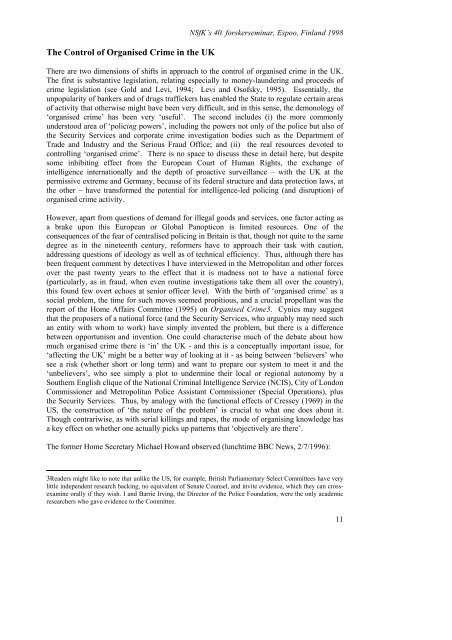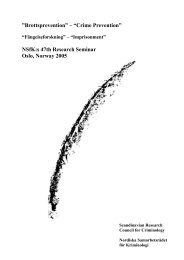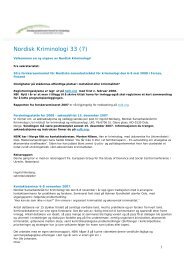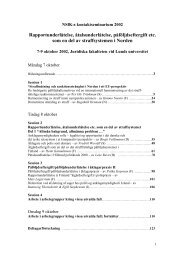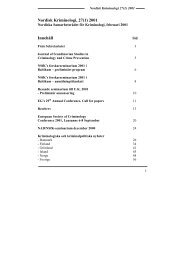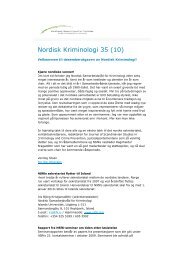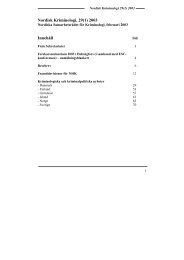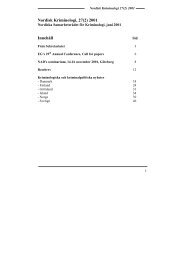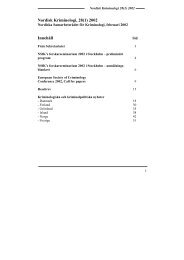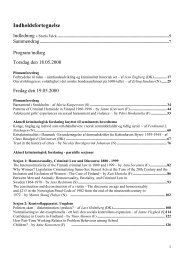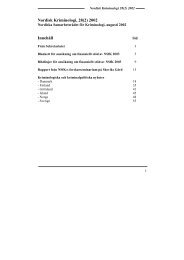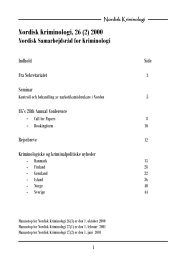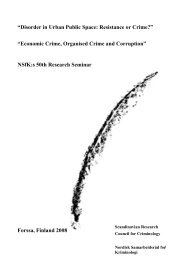Organised Crime & Crime Prevention - what works? - Scandinavian ...
Organised Crime & Crime Prevention - what works? - Scandinavian ...
Organised Crime & Crime Prevention - what works? - Scandinavian ...
Create successful ePaper yourself
Turn your PDF publications into a flip-book with our unique Google optimized e-Paper software.
The Control of <strong>Organised</strong> <strong>Crime</strong> in the UK<br />
NSfK’s 40. forskerseminar, Espoo, Finland 1998<br />
There are two dimensions of shifts in approach to the control of organised crime in the UK.<br />
The first is substantive legislation, relating especially to money-laundering and proceeds of<br />
crime legislation (see Gold and Levi, 1994; Levi and Osofsky, 1995). Essentially, the<br />
unpopularity of bankers and of drugs traffickers has enabled the State to regulate certain areas<br />
of activity that otherwise might have been very difficult, and in this sense, the demonology of<br />
‘organised crime’ has been very ‘useful’. The second includes (i) the more commonly<br />
understood area of ‘policing powers’, including the powers not only of the police but also of<br />
the Security Services and corporate crime investigation bodies such as the Department of<br />
Trade and Industry and the Serious Fraud Office; and (ii) the real resources devoted to<br />
controlling ‘organised crime’. There is no space to discuss these in detail here, but despite<br />
some inhibiting effect from the European Court of Human Rights, the exchange of<br />
intelligence internationally and the depth of proactive surveillance – with the UK at the<br />
permissive extreme and Germany, because of its federal structure and data protection laws, at<br />
the other – have transformed the potential for intelligence-led policing (and disruption) of<br />
organised crime activity.<br />
However, apart from questions of demand for illegal goods and services, one factor acting as<br />
a brake upon this European or Global Panopticon is limited resources. One of the<br />
consequences of the fear of centralised policing in Britain is that, though not quite to the same<br />
degree as in the nineteenth century, reformers have to approach their task with caution,<br />
addressing questions of ideology as well as of technical efficiency. Thus, although there has<br />
been frequent comment by detectives I have interviewed in the Metropolitan and other forces<br />
over the past twenty years to the effect that it is madness not to have a national force<br />
(particularly, as in fraud, when even routine investigations take them all over the country),<br />
this found few overt echoes at senior officer level. With the birth of ‘organised crime’ as a<br />
social problem, the time for such moves seemed propitious, and a crucial propellant was the<br />
report of the Home Affairs Committee (1995) on <strong>Organised</strong> <strong>Crime</strong>3. Cynics may suggest<br />
that the proposers of a national force (and the Security Services, who arguably may need such<br />
an entity with whom to work) have simply invented the problem, but there is a difference<br />
between opportunism and invention. One could characterise much of the debate about how<br />
much organised crime there is ‘in’ the UK - and this is a conceptually important issue, for<br />
‘affecting the UK’ might be a better way of looking at it - as being between ‘believers’ who<br />
see a risk (whether short or long term) and want to prepare our system to meet it and the<br />
‘unbelievers’, who see simply a plot to undermine their local or regional autonomy by a<br />
Southern English clique of the National Criminal Intelligence Service (NCIS), City of London<br />
Commissioner and Metropolitan Police Assistant Commissioner (Special Operations), plus<br />
the Security Services. Thus, by analogy with the functional effects of Cressey (1969) in the<br />
US, the construction of ‘the nature of the problem’ is crucial to <strong>what</strong> one does about it.<br />
Though contrariwise, as with serial killings and rapes, the mode of organising knowledge has<br />
a key effect on whether one actually picks up patterns that ‘objectively are there’.<br />
The former Home Secretary Michael Howard observed (lunchtime BBC News, 2/7/1996):<br />
3Readers might like to note that unlike the US, for example, British Parliamentary Select Committees have very<br />
little independent research backing, no equivalent of Senate Counsel, and invite evidence, which they can crossexamine<br />
orally if they wish. I and Barrie Irving, the Director of the Police Foundation, were the only academic<br />
researchers who gave evidence to the Committee.<br />
11


